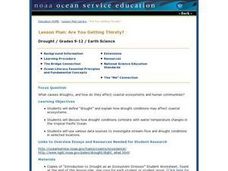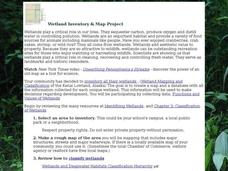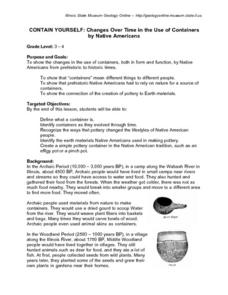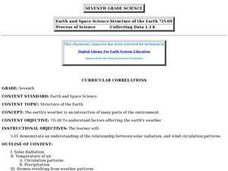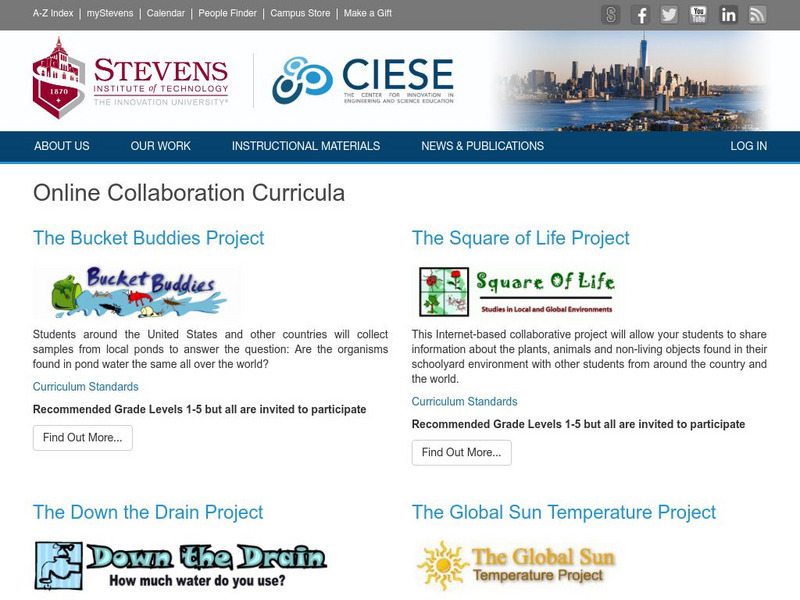Curated OER
VS.3g
Third graders explore describing the interactions between the English settlers and the Powhatan people. They include the contributions of the Powhatan's to the survival of the settlers and review how the Powhatan people and the English...
Curated OER
Vibrant Volcanoes
Students explore volcanoes. In this science lesson plan, students discuss the characteristics of volcanoes and view a video segment about a volcano. Students examine plate tectonics.
Curated OER
Plant Cycles
Young scholars identify plants parts and their functions. In this plant cycle lesson, students examine parts of plants and how the parts help them survive in its environment. Young scholars use graphic organizers, the internet, books...
Curated OER
Are You Getting Thirsty?
Students study droughts and how they affect communities and coastal ecosystems. In this ecosystems lesson plan students use data to examine drought conditions in certain areas.
Curated OER
Wetland Inventory and Map Project
In this wetlands inventory and map project worksheet, students do research on the wetlands and complete a map project about it. Students follow 6 sets of directions with Internet links.
Curated OER
Season's Greetings
Students explore Earth's seasons using an interactive website. In this earth science lesson, students watch video segments and explain Earth's seasonal milestones. They discuss the factors that causes seasonal changes.
Curated OER
Minimize the Effects of Fire
Students explore environmental safety by reading assigned text in class. In this fires instructional activity, students discuss the benefits and negative aspects of lighting a fire near a campground. Students list other ways to avoid...
Curated OER
Sedimentation
Students are introduced to the various types of sedimentation. In groups, they define the term and research what causes it to happen. They compare and contrast the different types of sedimentation and research how it occurs off of Cape...
Curated OER
Riparian: The Guardian of the Waterways
Students become educated on what a riparian is, the need for riparian, and how a riparian corridor (forest, habitat) can protect waterways. Students construct dioramas depicting riparian habitats.
Curated OER
Report of Shop, Factory, Mill or Industrial Establishment
Students examine the pollution survey created in response to the Public Health Laws of 1903, and compare/contrast polluting factory discharges in 1903 to those allowed today. They analyze the report survey, complete a worksheet, and...
Curated OER
Contain Yourself: Changes Over Time in the Use of Containers by Native Americans
Students examine the types of containers used by Native Americans. They discover how their form and function has changed over time. They create their own container based on the Native American examples.
Curated OER
Earth's Weather
Seventh graders learn how solar radiation, latitude, and other factors affect weather. They break into six groups and are assigned a topic to research and to present their findings orally.
Curated OER
the Wonder of Wetlands
Students explore the importance of the wetland ecosystem, its properties and functions, as well as, the many birds, animals, and plant life found there.
Curated OER
Lake Superior Ecology Unit
Sixth graders research Lake Superior and its ecosystem. Students investigate the lake's cycles of mixing and stratification and how these cycles affect the biology of the lake. This lesson plan contains five days of activities.
Curated OER
Food Webs
Fourth graders discover how organisms depend upon each other in an ecosystem. In this ecosystems lesson plan, 4th graders use food webs to discuss the interdependence between organisms in an ecosystem.
Curated OER
Oil Trap Model
Students investigate oil accumulation by creating a model in their classroom. In this petroleum geology lesson, students discuss where oil comes from and why it is vital to our society at this particular time. Students cut out a 3-D...
TeachEngineering
Teach Engineering: All About Water!
Students learn about the differences between types of water (surface and ground), as well as the differences between streams, rivers and lakes. Then, they learn about dissolved organic matter (DOM), and the role it plays in identifying...
US Geological Survey
Earth's Water: Rivers and Streams
The USGS explains the definition of a river and how a river is supplied with water. Included is a cross section of a river. Click Home to access the site in Spanish.
Center for Innovation in Engineering and Science Education, Stevens Institute of Technology
Ciese Collaborative Projects: The Global Water Sampling Project
By testing your local water quality, you will be able to compare your results with students around the world. Register your class, and follow the project instructions. Additional teacher resources, references, and Ask-an-Expert sources...
CK-12 Foundation
Ck 12 Exploration Series: Simulations: Physics: Water Fountain
[Free Registration/Login Required] Learn about projectile motion and its relevance to the shape of a stream of water.
Missouri Botanical Garden
Missouri Botanical Garden: Water Pollution
Water pollution occurs when a body of water is adversely affected due to the addition of large amounts of materials to the water. The sources of water pollution are categorized as being a point source or a non-source point of pollution....
PBS
Nh Pbs: Nature Works: Rivers and Streams
Learn more about Rivers and Streams through this educational resource. This site features photographs, a description, fun facts, and more about this type of freshwater ecosystem.
Center for Innovation in Engineering and Science Education, Stevens Institute of Technology
Ciese: Collaborative Projects
Using a variety of science topics, these projects link your class with classes around the world in data collection and analysis. There are projects recommended for all grade levels. Begin dates and end dates are listed to help in...
Other
Nc Department of Energy and Natural Resources: What Is Stormwater Pollution
When it rains, some of the rainwater soaks into the ground, and part of it flows over the ground and directly into creeks, streams, or rivers. This water that runs off into the river is called runoff, or sometimes stormwater runoff....





